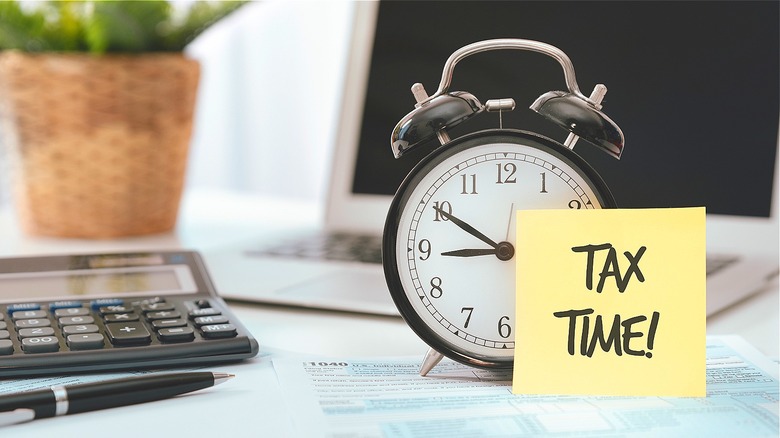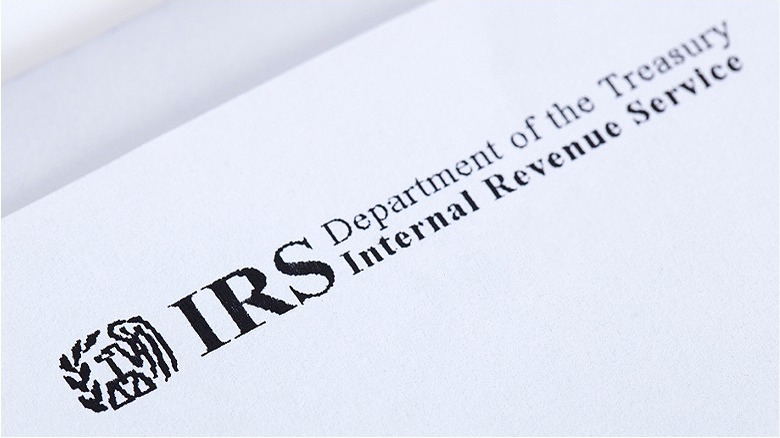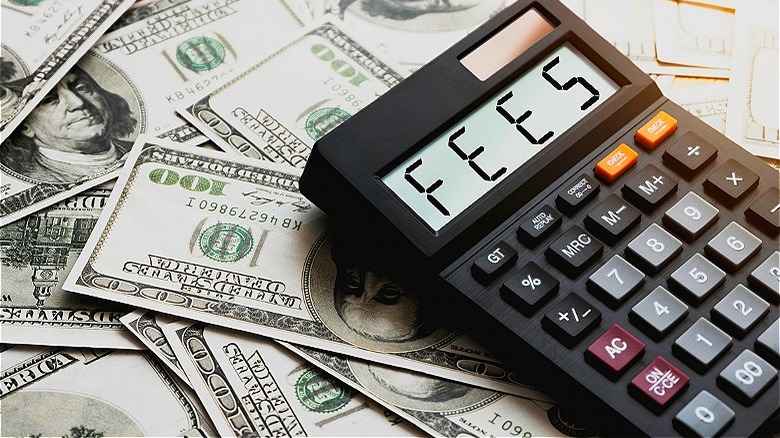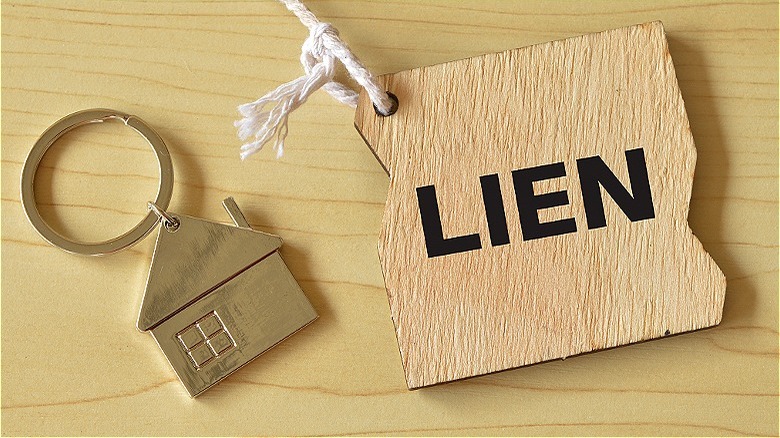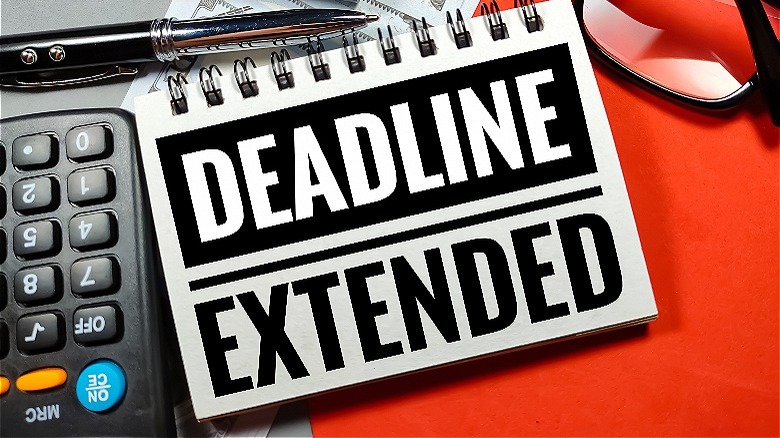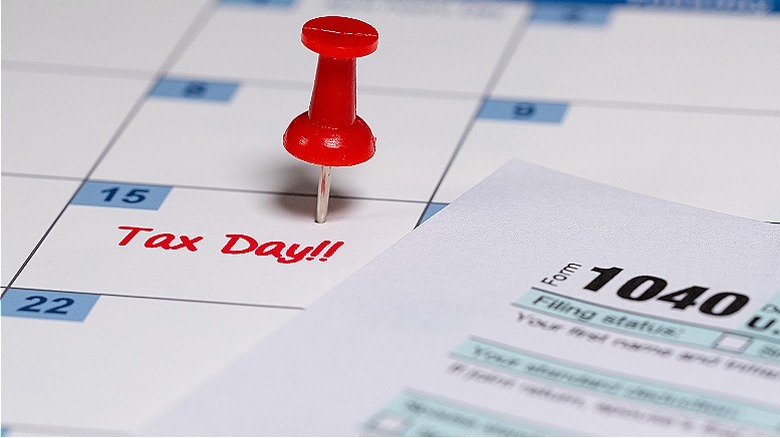What Really Happens If You Don't File Your Federal Income Taxes By The April Deadline?
It's an annual ritual that's relished by no one, except for perhaps accountants. Every spring marks the time to file your income tax return with Uncle Sam. While some citizens are exempt from filing a tax return, such as low-income earners who make less than the standard deduction, most of us do need to file by the deadline every April. If you don't, you'll face increasingly more serious consequences the longer you delay.
Whether you're looking forward to receiving a significant refund and/or dreading making up for an underpayment during the prior year, what really happens if you don't file taxes by the April deadline? Will the IRS come knocking at your door? Will your wages be garnished, or will a lien be placed on your house? While those things can eventually happen, in the short term, the actual consequences of not sending your tax return in by the April deadline aren't that severe. Still, you'll want to file your return as early as possible, especially if you think you'll owe taxes. That's because fees and interest will immediately start to accumulate on the unpaid balance, costing you more money.
Expect a sternly worded letter
In most states except for Maine and Massachusetts, the 2024 deadline for filing taxes is April 15. Residents of those New England states have an extra two days, until April 17, to file. If you're unable to submit a federal return by that date and the IRS finds you're obligated to do so, its first line of recourse is to send you a letter.
The revenue service typically has your income information by way of the 1099 and W2 forms that your employer(s) provides. Agents will view that income against the amount of taxes withheld from your paychecks to determine if it's likely you owe any additional taxes. If so, you'll likely receive a letter from the IRS requesting you file a return.
Under the above guidelines, you might think that it's not a high priority to file a timely return if you don't owe any money, but that's not entirely true. Yes, you may be lower on the IRS's list of priorities than someone who's found to owe money, but the agency will still want to see your return — even if you don't owe anything. As TurboTax explains, owing tax to the IRS and the tax filing requirement are entirely separate.
You could face fees and additional interest
If you owe the IRS money and fail to file by the annual April deadline, the agency will charge you a Failure to File penalty. Presently, that penalty is 5% of the amount owed for each month your return is overdue, with a maximum penalty of 25%. Once your tax return is filed and taxes are paid, you can reportedly ask the IRS to remove the penalty via a process called abatement, though this forgiveness is typically limited to the first time a taxpayer misses a deadline.
Further, you will also owe interest on the outstanding tax liability, in addition to any other penalties. When calculating interest due, the IRS uses a short-term rate called the Applicable Federal Rate, then adds 3%. For the first quarter of 2024, the total interest rate for individuals who underpay, or fail to pay, is 8% per year. Interest begins accumulating from the day your bill was due, which is typically the same day as the filing deadline in mid-April.
If you're due a refund, but fail to file your return on time, there's no penalty involved. However, if you wait too long to file, there's a risk of losing any refund you may be entitled to. Typically, if more than three years have passed since the original due date of the return, the statute of limitations on claiming a refund will have passed and any funds will have been lost.
What's the worst that could happen?
We've already established that late filing can incur fees and interest from the IRS, but what about if you still refuse to file? The IRS can escalate the situation by filing liens and levies. A lien is "a legal claim against your property to secure payment of your tax debt," according to the IRS. The property on which a lien can be placed includes financial assets, real estate, or even vehicles.
When this happens, the agency will alert other creditors of the secured claim against your assets by publishing a Notice of Federal Tax Lien. If one of the credit bureaus, such as Equifax or TransUnion, finds this notice, the bureau will include it as a negative event on your credit report, which will hurt your credit score.
If that sounds bad, a levy is even worse. That's because a levy involves the actual seizure of your property to pay a tax debt. As the IRS notes, the "Internal Revenue Code (IRC) authorizes levies to collect delinquent tax." With a certain few exceptions, any personal property on which a lien can be placed can also be levied. This includes a levy on your income, aka wage garnishments. The IRS can't take all of your income — you will need some income for living expenses — but it can levy a decent chunk of your paycheck, so don't ignore the warning signs.
Ask for a six-month extension to file
If you're struggling to complete your tax return by the April due date or are waiting on additional documents to do so, there's always the option to file for an extension. Filling out and submitting IRS Form 4868 — online or by mail — takes little time commitment and gives tax filers an additional six months to submit their tax returns. For example, in 2023, an extension request bumped the filing deadline out to October 16 rather than April 18. There are a few caveats, however.
Firstly, the extension form must be filed by the same deadline as the tax return would've been due. You can't realize you missed the filing deadline, then request an extension after mid-April. Having up to an extra six months to get your paperwork in order can remove some stress, however, that doesn't mean you'll have extra time to pay. If you think you'll owe taxes, you'll need to make an estimate of the amount and submit that payment along with the extension request.
Even though your estimated tax payment is just that, an estimate, any amount you contribute by the April deadline will effectively reduce late fees and interest charges that may be due. If you're fairly confident you won't owe any taxes — or even expect a refund — you can just submit the extension form without any estimated payment.
File by April, even if you can't pay
It can be a dreadful feeling to know you're going to owe federal income taxes you can't afford to pay. As tempting as it might be to sweep the whole thing under the rug, ignoring the problem won't make it go away. Instead, file your return by the April deadline, pay what you can afford, and open a dialog with the IRS over establishing a payment plan. Best of all, a payment plan can be set up online using the IRS's payment plan tool.
Your specific tax situation will dictate which types of plans you may be eligible for, but generally speaking, there are short-term plans (180 days or less) and long-term plans (called installment plans) with regular monthly payments. Fees vary for setting up a payment plan, as do interest rates and late charges, but in any case, the financial consequences will be less costly and damaging than failing to file and pay altogether.
Finally, if you're able to borrow money to pay owed taxes from family or a financial institution — even a promotional low-interest rate credit card — that could be the most economical way forward to resolve your tax situation. Just be sure to treat this event as a learning experience and have the proper amount withheld from your earnings in the future. If you're self-employed, calculate and diligently make the estimated quarterly payments to avoid falling into the same trap next year.
